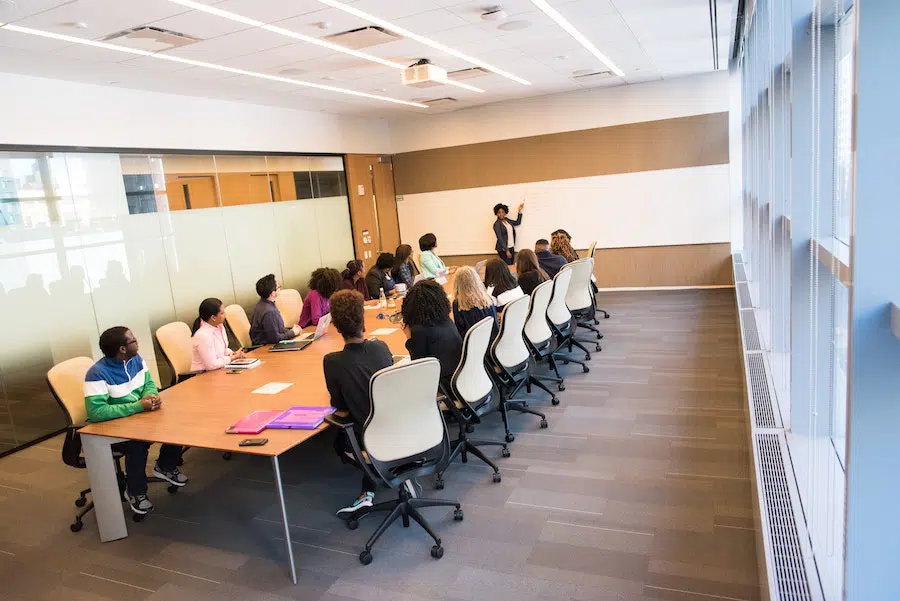Last Updated on: 29th August 2022, 08:25 am
If you’re curious about how to be a good PhD student, this article is a good place to start. As a professor for over 30 years, much of that as a Dissertation Committee Chair, I’ve watched many students navigate the PhD process–some better than others. Here’s my advice for how to be a good PhD student.
Think Backward
Think about where you want to get to, then look at the steps you have to take to get there. Be good at each of the steps. Your academic career is a building block system and you don’t really see that until you get to the end. If you do excellent work at each step, you’ll assure yourself a strong foundation for your career.
For example, you’re going to have to do a dissertation. As part of your dissertation, you’ll have to write a literature review. If you have a sense of the topic you’d like to study when you begin your program, you can collect research that you find in your classes. That will give you a strong basis for your literature review.
If you intend to use a particular research approach, take the classes where you learn how to do it effectively.

In your coursework, try to undertake studies that resemble the study you’re going to do when you write your dissertation. I would even try to use the same software that you’re going to use when you write your dissertation–you’ll have a better grasp of it this way when it comes to analyzing your data, and you won’t have to spend days figuring it out while a deadline approaches.
Build the Right Committee
Select committee members who really believe in your topic. They’re going to be a big part of your life, and their enthusiasm and support can help carry you through in times when you’re feeling that isolation.
And as a corollary, find out if there are faculty members who don’t like each other, and don’t side with either of them. Definitely don’t put them both on your committee. Do your best to avoid politics.
Get to Know People

Build relationships with other students. While being a PhD student is lonely, when there are fellow students there, and it’s helpful to become friends with them. Since academic fields are so small, the number of people with your particular interest in a field can be pretty low. You never know who will be on a hiring committee. This also reduces degrees of separation between you and others who you may want to get to know down the line.
Also, get to know the departmental assistant. They control a lot of things that will matter for you. Scheduling of classes, office allocation, and more. They can answer questions when your faculty isn’t available. If they know who you are, they may take your needs into account when making decisions.
Take Your Responsibility Seriously
Part of being a good PhD student is taking seriously your responsibility as an academic. You become the font of knowledge for a particular area, and you need to actually do that responsibly.
If you recognize that once you have this degree, people are going to look to you for answers in the area that you’re specializing in, you’ll work hard and learn what you need to learn. It’s important to recognize that people are going to be looking to you for answers because you have this degree. Taking this responsibility seriously means you have to be thorough in your research. You can’t skim over things.

AS an undergraduate, you can get by easily with “what do I need to know,” and as a PhD student you must ask, “what more can I learn?”
And society depends on you doing a good job. Most people didn’t even think about people who have PhDs in virology a year ago. Now, with the COVID-19 crisis, they’ve been called into service in a huge way. This is only one of many examples of why a doctoral degree comes with responsibility.
Create Routine and Structure
Get into a routine and stick to it when you get into your dissertation phase or make a new routine. But it’s incredibly important to have routine and structure. Otherwise, it’s very difficult to finish.
This could mean working between certain hours each day, creating a weekly schedule with goals and deadlines, or any number of variations. The important thing is to have a structure that works for you and that you can follow.
Use Resources

Take advantage of services that the university offers. If there there are instructional design courses, take some of those because you might be taking classes when you finish. If there is a writing center, get all the help you can with writing and ask them how to help others with writing.
As long as you’re paying tuition, you might as well get the most out of it, and be better at your job later.
Stay in Close Contact With Your Major Professor
This is up to you, it’s not up to them. You need to let your Major Professor know what’s going on in your life–if you’re having personal problems, you need to let them know in advance, as soon as it happens.
Let them know if you’re having trouble keeping up with the coursework or if there’s an area of contention between you and another professor or student. They have a huge job, and it’s up to you to reach out to them, not the other way around.
Present at Conferences as a Student

Conferences often have “poster sessions” or student sessions. Taking these opportunities to present can be useful for a few reasons:
- They gives you the opportunity to connect with other people who have the same interests
- You get an idea of how research is conducted and what ends up being topical and useful.
- You can see how you fit into the whole scheme of research within the broad field. Where your interests lie, who your gurus are.
- You get a better idea of an appropriate topic for your dissertation–what’s needed in the field.
Avoid Competitiveness
Try to be as good as you can, but not competitive. Academia is really a collaborative process, and in my view, competition has held academia back. The more collaborative we are as academics, the faster the field advances. When we share knowledge, resources, ideas, and enthusiasm, we can build knowledge more effectively.
We don’t need to think of ourselves as competitors because we’re contributing to knowledge in different ways. There are different niches, and different perspectives that are all valid.
Schedule Time to Not Do Doctoral Work

Schedule time that you don’t allow yourself to do doctoral work. It’s so hard not to do work, or not to feel guilty for not doing work, that it’s actually important to schedule time to rejuvenate–this will help you get through the long haul. Your brain needs breaks.
Do something rejuvenating–don’t just veg out in front of the television (though some of that is fine too). Go for a run, spend time in nature, create art, do whatever lights up your heart and makes you feel alive.
This is an often-overlooked, but extremely important point. Don’t forget about self-care as this can lead to burnout.
Commit to Graduating
It feels a lot better to pay off student loans when you have gotten a degree out of it.
Set yourself up for success by making graduating your goal. Continually remind yourself of your goal to finish. Continually readjust so that you can reach that goal. Even rocks change over time. You may have to adapt during your program.

For example, one former student who didn’t finish her degree said, “I wanted to spend more time with my newborn son, so I dropped out of my program. I could have readjusted and taken more years to complete my dissertation, but instead of readjusting I quit.”
Have the attitude of “how do I work through this problem” instead of “do I give up or not?” If you don’t have giving up as an option, you will find ways to readjust and work through problems.
This is why they give you ten years. Problems come up and readjustment is necessary.
Get Support
One of the biggest differences I’ve observed between PhD students who graduate and those who don’t is that the ones who graduate find the support that they need. While getting a doctorate is a solitary journey, it’s not one that can be taken completely alone. All doctoral students need support at some point, and learning to ask for it or seek it out when necessary is a vital skill for PhD students.
It can also help to hire a dissertation coach. A dissertation coach can provide a level of time, attention, and dedication to your success that your Chair won’t be able to because of their other commitments.
I’ve helped many students get through the most difficult parts of their doctoral journeys and finish their degrees–sometimes even finishing early and saving on tuition in the process. Feel free to get in touch to book a free 30-minute consultation if you think you might be interested.
 Waiting to Get Your Dissertation Accepted?
Waiting to Get Your Dissertation Accepted?


